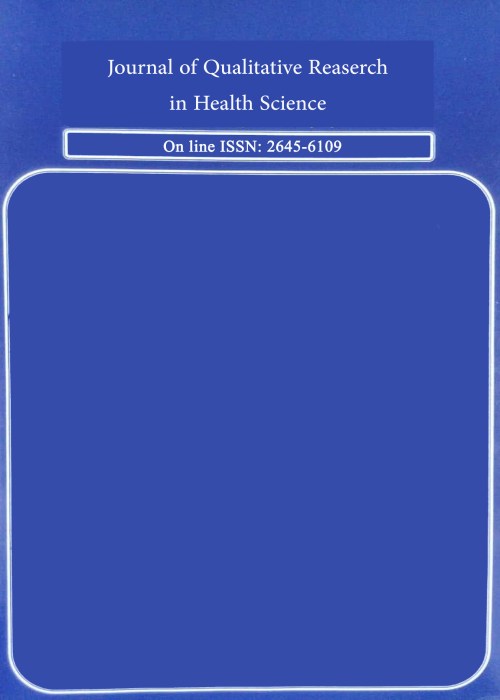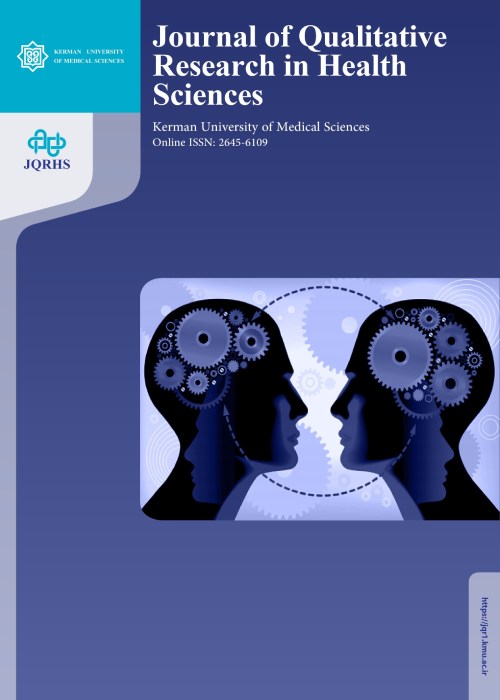فهرست مطالب

Journal of Qualitative Research in Health Sciences
Volume:12 Issue: 2, Summer 2023
- تاریخ انتشار: 1402/05/10
- تعداد عناوین: 8
-
-
Pages 60-67BackgroundNursing internship is a vital period for the formation of professional identity and development of clinical competency of nursing students, which has undergone extensive changes during the COVID-19 pandemic. The present study aimed to explain the experiences of nursing internship students during the COVID-19 pandemic in Iran.MethodsThis qualitative-descriptive study was conducted using the conventional content analysis method. Data were collected through semi-structured interviews. Participants included 15 nursing internship students of Shahid Beheshti University of Medical Sciences in Iran, who were selected using purposive sampling. The interviews continued until data saturation. The trustworthiness of the data was ensured using Lincoln and Guba’s criteria. Data were analyzed via MAXQDA (version 10).ResultsData analysis led to the identification of two themes: (1) Paradoxes in clinical education path (with two categories including impaired learning and effective clinical education) and (2) Psychological pressure in patient care (with two categories including student protection and safety concerns and disruption of professional interaction).ConclusionThe present study showed that the COVID-19 pandemic has created many challenges for clinical nursing education that will affect professional competency in the future. Therefore, educational administrators must take into account the experiences of students as the main stakeholders in clinical education planning.Keywords: Nursing, internship, Students, COVID-19, qualitative research
-
Pages 68-75Background
Parents are the main caregivers in raising children, and the quality and quantity of knowledge of parenting styles and child-rearing practices are essential for improving the growth, health, and correct upbringing of children. Thus, correct upbringing is one of the very important issues as it requires parental responsibility. To this end, the present study aimed to identify the components of effective parenting.
MethodsThis study was conducted using a conventional qualitative content analysis method. The participants were 9 family counseling specialists in Ahvaz, who were selected using homogeneous purposive sampling. The data were collected through in-depth and exploratory interviews. The collected data were analyzed using the six-step thematic analysis method proposed by Braun and Clarke.
ResultsThe analysis of the participants’ experiences revealed 5 main themes in effective parenting, including conscious knowledge, cohesion and intimacy in marital relationship, scientific application of direct and indirect parenting practices, a structured family, and creating a context for growth and availability.
ConclusionThe results reported in this study can have some implications for parents in using effective child-rearing practices. Besides, family counselors and psychologists can use the results of this study to increase parents’ awareness of effective parenting components and patterns by teaching the components of effective parenting to parents.
Keywords: Effective parenting, qualitative research, Thematic analysis -
Pages 76-83BackgroundOne of the basic steps to improve the quality of services provided to patients with COVID-19 is to recognize the dimensions of providing such services from the perspective of recipients. Accordingly, this study aimed to explain the COVID-19 patients’ experiences of healthcare system responsiveness during the disease course.MethodsThe present qualitative study was conducted using the conventional content analysis method in Iran from April 2020 to April 2021. Participants in this study included COVID-19 patients who were selected via purposive sampling. Data were collected through 34 telephone and face-to-face interviews and analyzed according to the method proposed by Graneheim and Lundman.ResultsQualitative analysis of the data led to the identification of impaired health system responsiveness as the main theme. The main theme consisted of two categories including the collapse of hospitals (with the subcategories of lack of resources and defects in process management) and providing low-quality care (with the subcategories of providing low-quality nursing services, lack of comprehensive care, and threats to patient safety).ConclusionTo provide quality care services to COVID-19 patients, the health system must consider improving its responsiveness to patient needs, expanding the physical space of healthcare centers, equipping hospitals with the accommodations and amenities required by patients, and providing conditions for the staff to be able to immediately respond to patient needs.Keywords: COVID-19, patients, Healthcare system, responsiveness, Qualitative study
-
Pages 84-90Background
Dental prescribing is considered a basis for short-term treatment of clinical problems. Therefore, dentists should be familiar with the patterns of rational drug prescription. Neglecting this important issue can lead to misprescription and side effects. Accordingly, the present study aimed to investigate the experiences of a group of dental specialists about prescribing drugs.
MethodsThis qualitative study was conducted using a conventional content analysis approach. A total of 19 specialists from 5 different fields (oral diseases, pediatric dentistry, oral and maxillofacial surgery, endodontics, and periodontics) participated in this study. Purposive and theoretical sampling was used to collect data and semi-structured in-depth interviews were conducted in the form of focus group discussions from each department at Kerman dental school. Data collection and content analysis were performed simultaneously.
ResultsThe analysis of the data revealed five categories including more frequently prescribed drugs, common concerns about prescribing drugs, recommendations for reducing potential side effects, experience of clinical pharmacology training, and criteria for prescribing new drugs.
ConclusionSince the knowledge of dental students affects the quality and effectiveness of treatment and patient safety, this study emphasized the need to improve clinical pharmacology training provided to dentistry students, residents, and dentists.
Keywords: Drug prescription, Dentistry, Clinical problems, qualitative research -
Pages 91-99BackgroundRespecting the human dignity of patients is one of the most important ethical requirements of the medical and nursing profession. Respect for dignity in all patients, especially in patients with breast cancer, is important because of the profound and lasting effects of this disease on patients. This study aimed to understand the perspective of patients with breast cancer on the concept of patient dignity from June 2020 to December 2020 in Iran Mehr Hospital (Radiotherapy and Oncology Center) in Birjand.MethodsThis study was conducted using a qualitative approach. The data were collected through semi-structured individual interviews and analyzed using qualitative content analysis. The data were saturated after interviewing 16 patients with breast cancer who were selected using purposive sampling from June 2020 to December 2020. The main interview question was, “What does ‘dignity’ mean to you based on your experiences during your time with cancer?” The data elicited from the interviews were analyzed using content analysis via MAXQDA 2012 software.ResultsAnalysis of the patients’ statements and experiences of maintaining dignity revealed three main themes. The first main theme was respect for human values, which included the subthemes of personal privacy, avoiding curiosity, confidentiality of information, and use of same-sex caregivers. The second main theme was psychological support, which included the subthemes of spousal and family empathy and support, understanding the patient’s concerns and preoccupations, resentment of pity, and disclosing cancer diagnosis. The third main theme was socioeconomic support, which included the subthemes of spousal and family financial support, financial aid by support organizations, and community awareness.ConclusionReceiving care by respecting dignity is the right of every patient. Since patients with cancer are more vulnerable, it can be argued that maintaining the dignity of these patients is more important than other patients due to the nature of the disease and the long-term involvement of patients with the disease.Keywords: breast cancer, Nursing, Ethics, Respect, Iran
-
Pages 100-106BackgroundThe journey to nursing professionalism is a constantly progressing process. The present study aimed to explain the experiences of nursing students and faculty members regarding the unseen consequences of the hidden curriculum for nursing professionalism.MethodsIn this qualitative study, 25 nursing students and faculty members at Mashhad University of Medical Sciences were selected and interviewed based on purposive sampling. After data collection, all the recorded interviews were transcribed and reviewed, and their subcategories, categories, and themes were extracted using the qualitative content analysis approach proposed by Graneheim and Lundman.ResultsA total of 1382 initial codes and two main themes were extracted from the interviews. The obtained categories were non-constructive and destructive clinical environment, unfavorable educational environment, the gap between theory and practice, inappropriate role model, neglect of scientific nursing knowledge, loss of professional values, undervaluing nursing professionalism, favorable clinical environment, favorable faculty environment, and faculty member as an effective role model.ConclusionProfessional behaviors have significant impacts on professionalism in nursing. There is a significant gap between the current nursing practice and professional nursing in some aspects. Therefore, it is important to consider all consequences of the hidden curriculum to achieve professionalism.Keywords: Hidden Curriculum, Nursing training, Consequences
-
Pages 107-112BackgroundSuicide is a complicated multifactorial phenomenon. Researchers have attempted to identify the reasons for suicide in different communities. The present study aimed to identify and scrutinize the risk factors for suicide among hospitalized patients.MethodsThis qualitative grounded theory study was conducted using in-depth interviews with 53 hospitalized patients in Mostafa Hospital in Ilam, Iran in 2021. Semi-open questions were asked by a psychologist. The interviews continued until reaching the saturation point and achieving the specific objectives of the study. Finally, coding was performed using the grounded theory method.ResultsA history of suicide attempts was reported by almost two-thirds of the individuals. The results of the primary coding of the items showed that the most important categories paving the path for committing suicide were social, financial, and family factors.ConclusionAccording to the results of the present study, the most important causal conditions contributing to suicide attempts were psychological factors, addiction and its related problems, divorce and its related problems, and love failure.Keywords: Attempts, Hospitalized, Qualitative study, risk factors, Suicide
-
Pages 113-119BackgroundIntensive care unit stays are associated with numerous complications. These complications can be reduced with timely and appropriate medical services. Mobile applications can provide these services without geographical limitations. Accordingly, the present study aimed to evaluate the statements by the intensive care staff and care team of intensive care survivors on the necessary functionality for designing a mobile-based system for monitoring and following up on patients discharged from intensive care.MethodsThis prospective study involved interviews with specialists that provided care to patients after discharge (including nurses, physicians, physiotherapists, speech therapists, psychologists, and nutritionists). The first interviewees were selected from the specialists in Kerman, Iran and then, the selection of the participants proceeded with the snowball sampling method. Interviews were transcribed and analyzed based on content analysis. Codes were extracted and categorized into three levels of abstraction using MAXQDA software.ResultsFour general categories emerged from the interview analysis: 1) Training, 2) Consultation, 3) Electronic health records (EHRs), and 4) Care team. The interviewees mentioned items such as nursing and physiotherapy training (training category), physician and psychological consultation (consultation category), nurses (care team category), and side reports (EHRs category).ConclusionThis study presented healthcare professionals’ opinions and statements regarding the requirements for developing a mobile-based intensive care follow-up system. User input is essential to design a scalable and efficient system. Provider input can create a system with all the necessary features. The results can be used to adjust insurance regulations, provide the necessary infrastructure, and train care teams.Keywords: Intensive care units, Software, Care team, Consultation, Training


